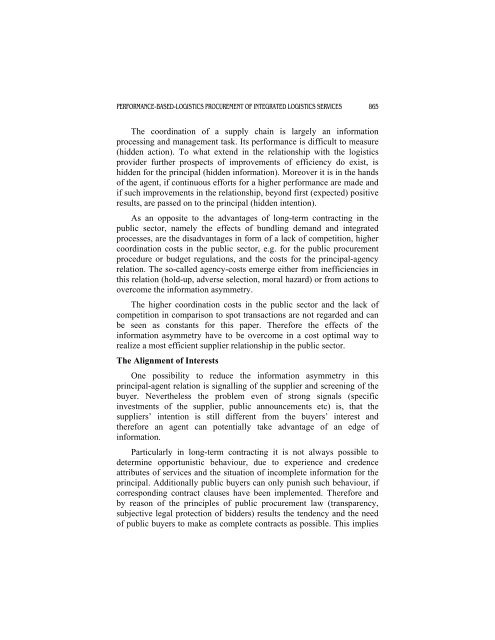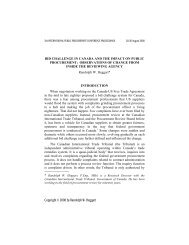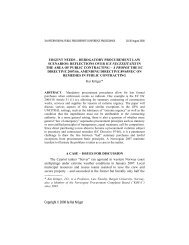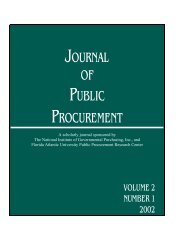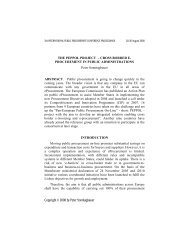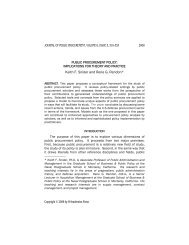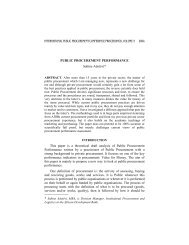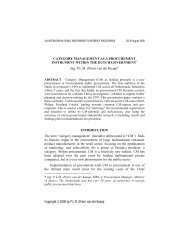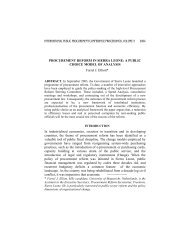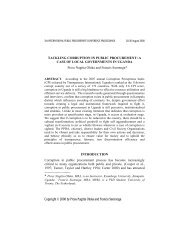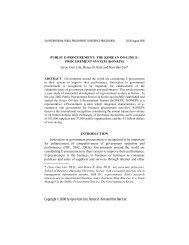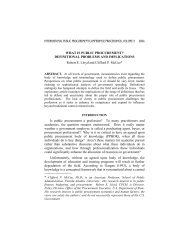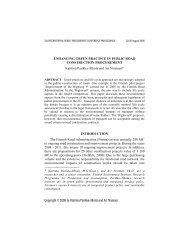Procurement of Integrated Logistics Services in the Public Sector
Procurement of Integrated Logistics Services in the Public Sector
Procurement of Integrated Logistics Services in the Public Sector
Create successful ePaper yourself
Turn your PDF publications into a flip-book with our unique Google optimized e-Paper software.
PERFORMANCE-BASED-LOGISTICS PROCUREMENT OF INTEGRATED LOGISTICS SERVICES 865The coord<strong>in</strong>ation <strong>of</strong> a supply cha<strong>in</strong> is largely an <strong>in</strong>formationprocess<strong>in</strong>g and management task. Its performance is difficult to measure(hidden action). To what extend <strong>in</strong> <strong>the</strong> relationship with <strong>the</strong> logisticsprovider fur<strong>the</strong>r prospects <strong>of</strong> improvements <strong>of</strong> efficiency do exist, ishidden for <strong>the</strong> pr<strong>in</strong>cipal (hidden <strong>in</strong>formation). Moreover it is <strong>in</strong> <strong>the</strong> hands<strong>of</strong> <strong>the</strong> agent, if cont<strong>in</strong>uous efforts for a higher performance are made andif such improvements <strong>in</strong> <strong>the</strong> relationship, beyond first (expected) positiveresults, are passed on to <strong>the</strong> pr<strong>in</strong>cipal (hidden <strong>in</strong>tention).As an opposite to <strong>the</strong> advantages <strong>of</strong> long-term contract<strong>in</strong>g <strong>in</strong> <strong>the</strong>public sector, namely <strong>the</strong> effects <strong>of</strong> bundl<strong>in</strong>g demand and <strong>in</strong>tegratedprocesses, are <strong>the</strong> disadvantages <strong>in</strong> form <strong>of</strong> a lack <strong>of</strong> competition, highercoord<strong>in</strong>ation costs <strong>in</strong> <strong>the</strong> public sector, e.g. for <strong>the</strong> public procurementprocedure or budget regulations, and <strong>the</strong> costs for <strong>the</strong> pr<strong>in</strong>cipal-agencyrelation. The so-called agency-costs emerge ei<strong>the</strong>r from <strong>in</strong>efficiencies <strong>in</strong>this relation (hold-up, adverse selection, moral hazard) or from actions toovercome <strong>the</strong> <strong>in</strong>formation asymmetry.The higher coord<strong>in</strong>ation costs <strong>in</strong> <strong>the</strong> public sector and <strong>the</strong> lack <strong>of</strong>competition <strong>in</strong> comparison to spot transactions are not regarded and canbe seen as constants for this paper. Therefore <strong>the</strong> effects <strong>of</strong> <strong>the</strong><strong>in</strong>formation asymmetry have to be overcome <strong>in</strong> a cost optimal way torealize a most efficient supplier relationship <strong>in</strong> <strong>the</strong> public sector.The Alignment <strong>of</strong> InterestsOne possibility to reduce <strong>the</strong> <strong>in</strong>formation asymmetry <strong>in</strong> thispr<strong>in</strong>cipal-agent relation is signall<strong>in</strong>g <strong>of</strong> <strong>the</strong> supplier and screen<strong>in</strong>g <strong>of</strong> <strong>the</strong>buyer. Never<strong>the</strong>less <strong>the</strong> problem even <strong>of</strong> strong signals (specific<strong>in</strong>vestments <strong>of</strong> <strong>the</strong> supplier, public announcements etc) is, that <strong>the</strong>suppliers’ <strong>in</strong>tention is still different from <strong>the</strong> buyers’ <strong>in</strong>terest and<strong>the</strong>refore an agent can potentially take advantage <strong>of</strong> an edge <strong>of</strong><strong>in</strong>formation.Particularly <strong>in</strong> long-term contract<strong>in</strong>g it is not always possible todeterm<strong>in</strong>e opportunistic behaviour, due to experience and credenceattributes <strong>of</strong> services and <strong>the</strong> situation <strong>of</strong> <strong>in</strong>complete <strong>in</strong>formation for <strong>the</strong>pr<strong>in</strong>cipal. Additionally public buyers can only punish such behaviour, ifcorrespond<strong>in</strong>g contract clauses have been implemented. Therefore andby reason <strong>of</strong> <strong>the</strong> pr<strong>in</strong>ciples <strong>of</strong> public procurement law (transparency,subjective legal protection <strong>of</strong> bidders) results <strong>the</strong> tendency and <strong>the</strong> need<strong>of</strong> public buyers to make as complete contracts as possible. This implies


